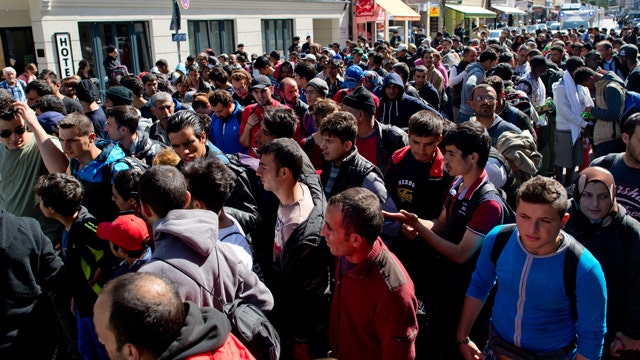Will flood of Syrian refugees leave US vulnerable to attack?
A fair and balanced debate on 'Cashin' In'
At Budapest’s Keleti Train Station last week, Mahmoud, a Syrian from Aleppo, looked around the underground concourse packed with new arrivals like himself. Judging from their accents and dialects, he reckoned that little more than 10 percent of them were Syrian. But he saw many more passing themselves off as Syrians.
Indeed, during his journey through Greece and the Balkans on his way to Hungary, “I found a bunch of Iraqis buying fake Syrian passports,” said Mahmoud, adding that now Syrians “are worried that their passports are being stolen.” Nearby, a countryman furtively showed his passport, tucked between the sole and padding of one of his sneakers.
As Europe moves to take in large numbers of refugees, particularly from Syria, some other migrants—often Iraqis, Libyans, Palestinians and Egyptians—are attempting to pass themselves off as Syrian, said aid workers, government officials and fellow migrants.
The trend is causing tensions between Syrians and migrants of other nationalities, as well as headaches for officials sifting through huge numbers of applicants to root out impostors.
The masquerade also risks undermining political support for the European Union’s open-door policy, with anti-immigrant parties in many countries ready to denounce the presence of economic migrants amid the wave of refugees. Of the 381,000 people who have landed in Italy and Greece this year—the two main entry points of the current wave of migrants—50 percent are Syrian, according to the United Nations High Commissioner for Refugees.
Because of the war in their country, Syrians are considered prima facie refugees under international law, meaning they don’t need to present further evidence to qualify for protected status.
And in recent weeks, the deaths of 71 migrants—some of whom were Syrians—in a Hungarian truck found in Austria, and particularly images of the body of a 3-year-old Syrian boy washed up on a Turkish beach, have generated a wave of goodwill toward them. As a result, Syrians enjoy markedly better treatment than others along their journey.
German Chancellor Angela Merkel warned that Germany won’t absorb the thousands of economic migrants who are mixed among the 800,000 migrants expected to apply for asylum this year. “Those with no prospect of staying must leave our country,” she said.

